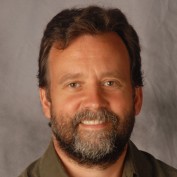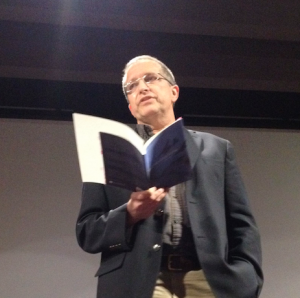A State Full of Poetry
If you’ve ever wondered what it’s like to be surrounded by 7,500 bears in a stadium—well, you and Associate Professor of English Mark Stevick have that in common. His poem “A Stadium Full of Bears” was recently recognized by Mass Poetry in its “Poem of the Moment” collection online.
“There are 7,500 bears in Pennsylvania. If you put
all those bears in a stadium—that’s a lot of bears.”
—my dad
As the rows fill up, there would be the usual
jostling and scuffles over seats. Even before
the kick-off, imagine the noise from the stands!
Think of the lines to the women’s rooms,
to say nothing of the tussles outside Gate E
to the cheap seats. Vendors hawk peanuts
over a din of growls and complaints about
parking or ticket prices; chums discuss Greenpeace
or annual weight gain; someone points out how
you could make a killing here on smoked salmon;
and everyone is generally ignoring the scoreboard
and adjusting their scarves and seat cushions as they
assemble, everywhere a bear, a common species,
a stadium full of bears, shuffling and shrugging
and sucking their paws, negotiating for a little
space and a decent view, getting ready—the bears
are getting ready for something to happen, something
important, something truly out of the ordinary.
Stevick wrote the poem in 1997, and it has since been published in Aesthetica Annual magazine (2013), Imago Dei: Poems from Christianity and Literature (2011), and Traveling: An Anthology of Award-Winning Poetry (2005). His recognition by Mass Poetry adds to his status as a local poet already renowned for his plays Cry Innocent and Goodnight, Captain White, which are performed in Salem, Massachusetts, on a frequent basis.
Mass Poetry is a non-profit organization headquartered in Boston that seeks to inspire and cultivate a community of poetry readers around the state of Massachusetts. The group hosts innovative events throughout the year that celebrate the art of poetry while supporting local writers, such as each spring’s Massachusetts Poetry Festival (happening May 1 to 3 in Salem this year), which sponsors 150 of today’s top poets. Another Mass Poetry initiative is Poetry on the T, which replaces some MBTA ads with poems for a month (this year starting May 4).
Stevick has been influential in the celebration of National Poetry Month closer to home. In the past, he has organized Poetry at Gordon, a month filled with guest speakers and daily poetry read aloud by faculty and staff members. Most recently he welcomed poet Brad Davis to his classroom for a guest lecture and poetry reading as part of the Princemere Writers Series.
The series brings emerging and established writers to campus, including C. B. Anderson, winner of the Mark Twain Award for short fiction; Sven Birkerts, editor of AGNI, author of The Gutenberg Elegies, NEA and Guggenheim winner; Daniel Bosch, winner of the Boston Review Poetry Prize, author of Crucible; John Canaday, author of The Invisible World, winner of the Walt Whitman Award; Brad Davis, winner of the Sunken Garden Poetry Prize; Peter Davison, poetry editor of The Atlantic Monthly and author of The Fading Smile; Rhina Espaillat, author of Lapsing to Grace and winner of awards from Poetry Society of America; Henry Ferrini, filmmaker, writer/director of Lowell Blues and Polis is This; Erica Funkhouser, poetry professor at MIT and winner of a Guggenheim; Joseph Hurka, author of Fields of Light and winner of the Pushcart Editors’ Book Award; Bill Jolliff, poet-in-residence, George Fox College, author of The Poetry of John Greenleaf Whittier; John Leax, poet-in-residence, Houghton College, author of The Task of Adam; Paul Mariani, former chair of English at UMass Amherst and Boston College, NEA & Guggenheim winner; Colleen Michaels, founder/director of The Improbable Places Poetry Tour; Micheal O’Siadhail, author of The Gossamer Wall and winner of the Marten Toonder Prize for Literature; Peter Orner, MFA Iowa Writer’s Workshop, whose collection of stories Last Car Over the Sagamore Bridge was named a New York Times Editor’s Choice book; Lisa Rosenberg, runner-up for the Yale Younger Series Award; Jeanne Walker, author of Coming Into History, winner of PEW and NEA fellowships.
 The Bell
The Bell
